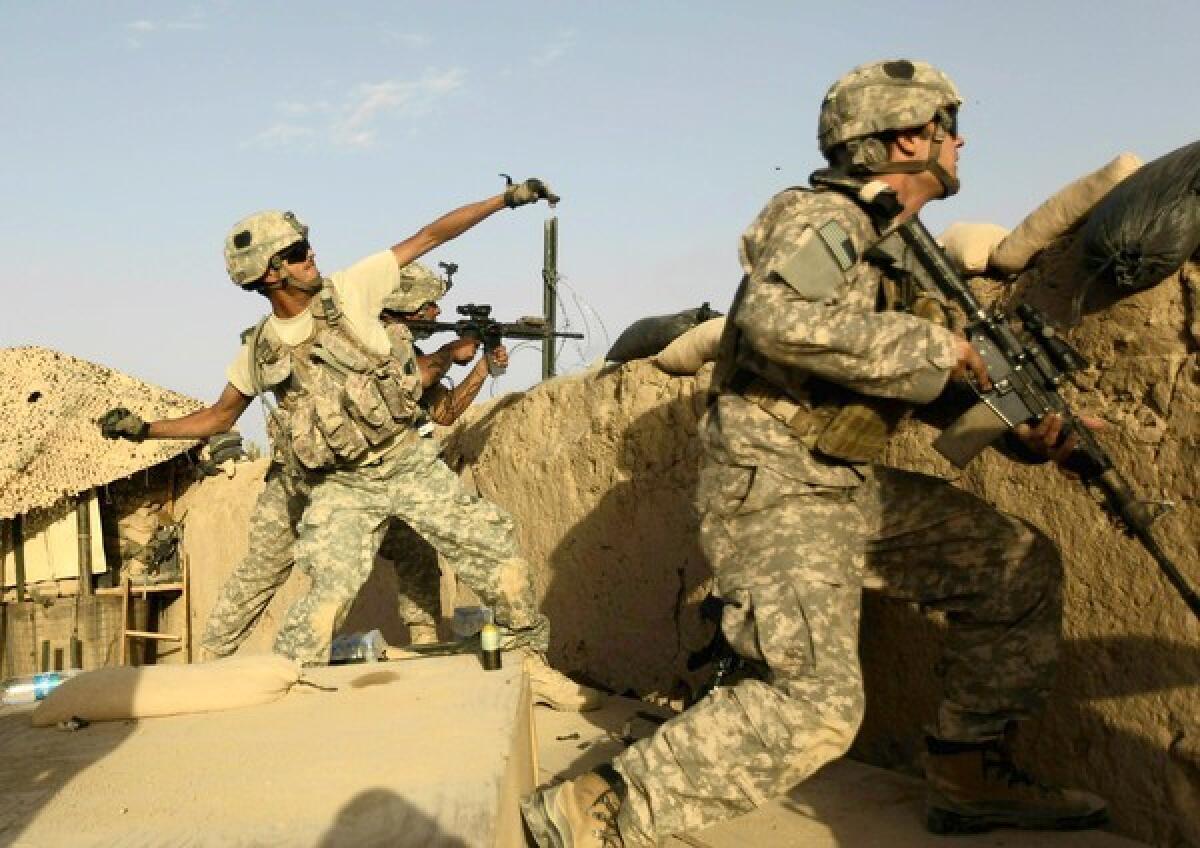Opinion: On Veterans Day, Americans should think less about the warriors and more about the wars

This Veterans Day, Americans will roll out the thanks: parades, tributes and enough free chain restaurant food to satiate the most gluttonous Marine for a week. Some U.S. veterans, particularly those who have served overseas in combat, are increasingly skeptical of this cheap grace. Despite the often-genuine outpouring of affection, thanks and “support” for veterans, many Americans know little and seemingly care even less about the wars their veterans have fought over the past two decades.
A reminder: Veterans Day is for the living, not the dead. We have Memorial Day, half a year away, to mourn those who made the ultimate sacrifice for their comrades and their country.
America now has nearly 3.5 million post-9/11 veterans, a little over 1% of the total U.S. population. The oldest are now grandparents while the youngest are barely of legal drinking age. More diverse and better educated than previous generations of American veterans, the post-9/11 veterans are also far more likely to have some degree of disability from their service. Roughly two-thirds served in Iraq, Afghanistan or both.
American veterans are profoundly shaped and changed by their service. Their pride in the nation’s armed forces and in their own service is largely undimmed. A January survey by Smithsonian magazine, Stars and Stripes and George Mason University found that 90% of U.S. veterans would make the choice to serve again and nearly as many would want their son or daughter to serve in the military.
Yet, in spite of that justifiable pride, this country’s veterans have come to grasp the futility and the hubris of the wars on which most spent their youth. A Pew Research Center survey over the summer found that 64% of veterans thought the war in Iraq was not worth fighting, and 58% said the same about the war in Afghanistan. Despite being largely successful at the time the survey was taken, the campaign against Islamic State in Syria was also viewed as “not worth it” by 55% of veterans. The rank of the respondents and whether they served in combat made no statistical difference.
These numbers on veterans’ views are virtually identical to those of the broader civilian population. Americans are uneasy with endless wars in the Middle East, as the polling shows. Yet, despite today’s outpouring of gratitude to our veterans, Americans, in the main, appear to not care enough to actually learn about our unwinnable wars and push our politicians to end them.
The war in Afghanistan quietly marked its 18th year last month, occasioning a few grim jokes and what appeared to be a collective national shrug. Amorphous terms like “security” and “terrorism” remain a major concern of voters, but the actual wars are generally ignored.
With news consumption mainly occurring online, American journalists have told me that reporting on the wars receives little attention — stories about the conflict in Afghanistan get few clicks in 2019. Even at the height of the Iraq war in 2006, most young American adults couldn’t find Iraq on a map of the Middle East.
Nearly a decade ago, long before he was President Trump’s embattled chief of staff or a private citizen, Marine Gen. John F. Kelly used to give a speech about heroism and sacrifice. A combat veteran and Gold Star father, Kelly told the tale of two Marines, Cpl. Jonathan Yale and Lance Cpl. Jordan Haerter. In April 2008, Yale and Haerter stood their ground in the face of a massive suicide truck bomb attack, giving their lives and saving dozens of their fellow Marines and Iraqi soldiers.
During the speech, Kelly blasted “those who claim to support [veterans] but not the cause that takes their innocence, their limbs and even their lives.” He noted that even with our all-volunteer military, “as a democracy, ‘we the people’ — and that by definition is every one of us — sent them away from home and hearth to fight our enemies. We are all responsible.”
Kelly had it half right. We are all responsible. But unquestioning support or apathy for our wars is also a betrayal. We don’t care about our veterans if we don’t care about the wars those veterans fought, wars that are still being fought, with no victory in sight. Stash the free food and stifle the rote “Thank you for your service.” If they truly support their veterans, Americans should learn about the wars being fought in their name, with their taxes, by their fellow citizens. This Veterans Day, Americans should think less about their warriors and more about their wars.
Gil Barndollar is the military fellow-in-residence at the Catholic University of America’s Center for the Study of Statesmanship and a senior fellow at Defense Priorities. He served as a Marine infantry officer from 2009 to 2016.
More to Read
A cure for the common opinion
Get thought-provoking perspectives with our weekly newsletter.
You may occasionally receive promotional content from the Los Angeles Times.










